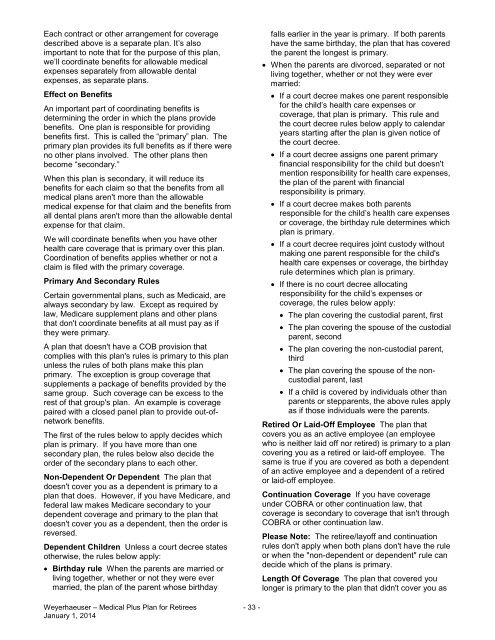MEDICAL PLUS PLAN FOR RETIREES - Premera Blue Cross
MEDICAL PLUS PLAN FOR RETIREES - Premera Blue Cross
MEDICAL PLUS PLAN FOR RETIREES - Premera Blue Cross
Create successful ePaper yourself
Turn your PDF publications into a flip-book with our unique Google optimized e-Paper software.
Each contract or other arrangement for coverage<br />
described above is a separate plan. It’s also<br />
important to note that for the purpose of this plan,<br />
we’ll coordinate benefits for allowable medical<br />
expenses separately from allowable dental<br />
expenses, as separate plans.<br />
Effect on Benefits<br />
An important part of coordinating benefits is<br />
determining the order in which the plans provide<br />
benefits. One plan is responsible for providing<br />
benefits first. This is called the “primary” plan. The<br />
primary plan provides its full benefits as if there were<br />
no other plans involved. The other plans then<br />
become “secondary.”<br />
When this plan is secondary, it will reduce its<br />
benefits for each claim so that the benefits from all<br />
medical plans aren't more than the allowable<br />
medical expense for that claim and the benefits from<br />
all dental plans aren't more than the allowable dental<br />
expense for that claim.<br />
We will coordinate benefits when you have other<br />
health care coverage that is primary over this plan.<br />
Coordination of benefits applies whether or not a<br />
claim is filed with the primary coverage.<br />
Primary And Secondary Rules<br />
Certain governmental plans, such as Medicaid, are<br />
always secondary by law. Except as required by<br />
law, Medicare supplement plans and other plans<br />
that don't coordinate benefits at all must pay as if<br />
they were primary.<br />
A plan that doesn't have a COB provision that<br />
complies with this plan's rules is primary to this plan<br />
unless the rules of both plans make this plan<br />
primary. The exception is group coverage that<br />
supplements a package of benefits provided by the<br />
same group. Such coverage can be excess to the<br />
rest of that group's plan. An example is coverage<br />
paired with a closed panel plan to provide out-ofnetwork<br />
benefits.<br />
The first of the rules below to apply decides which<br />
plan is primary. If you have more than one<br />
secondary plan, the rules below also decide the<br />
order of the secondary plans to each other.<br />
Non-Dependent Or Dependent The plan that<br />
doesn't cover you as a dependent is primary to a<br />
plan that does. However, if you have Medicare, and<br />
federal law makes Medicare secondary to your<br />
dependent coverage and primary to the plan that<br />
doesn't cover you as a dependent, then the order is<br />
reversed.<br />
Dependent Children Unless a court decree states<br />
otherwise, the rules below apply:<br />
• Birthday rule When the parents are married or<br />
living together, whether or not they were ever<br />
married, the plan of the parent whose birthday<br />
falls earlier in the year is primary. If both parents<br />
have the same birthday, the plan that has covered<br />
the parent the longest is primary.<br />
• When the parents are divorced, separated or not<br />
living together, whether or not they were ever<br />
married:<br />
• If a court decree makes one parent responsible<br />
for the child’s health care expenses or<br />
coverage, that plan is primary. This rule and<br />
the court decree rules below apply to calendar<br />
years starting after the plan is given notice of<br />
the court decree.<br />
• If a court decree assigns one parent primary<br />
financial responsibility for the child but doesn't<br />
mention responsibility for health care expenses,<br />
the plan of the parent with financial<br />
responsibility is primary.<br />
• If a court decree makes both parents<br />
responsible for the child’s health care expenses<br />
or coverage, the birthday rule determines which<br />
plan is primary.<br />
• If a court decree requires joint custody without<br />
making one parent responsible for the child's<br />
health care expenses or coverage, the birthday<br />
rule determines which plan is primary.<br />
• If there is no court decree allocating<br />
responsibility for the child’s expenses or<br />
coverage, the rules below apply:<br />
• The plan covering the custodial parent, first<br />
• The plan covering the spouse of the custodial<br />
parent, second<br />
• The plan covering the non-custodial parent,<br />
third<br />
• The plan covering the spouse of the noncustodial<br />
parent, last<br />
• If a child is covered by individuals other than<br />
parents or stepparents, the above rules apply<br />
as if those individuals were the parents.<br />
Retired Or Laid-Off Employee The plan that<br />
covers you as an active employee (an employee<br />
who is neither laid off nor retired) is primary to a plan<br />
covering you as a retired or laid-off employee. The<br />
same is true if you are covered as both a dependent<br />
of an active employee and a dependent of a retired<br />
or laid-off employee.<br />
Continuation Coverage If you have coverage<br />
under COBRA or other continuation law, that<br />
coverage is secondary to coverage that isn't through<br />
COBRA or other continuation law.<br />
Please Note: The retiree/layoff and continuation<br />
rules don't apply when both plans don't have the rule<br />
or when the "non-dependent or dependent" rule can<br />
decide which of the plans is primary.<br />
Length Of Coverage The plan that covered you<br />
longer is primary to the plan that didn't cover you as<br />
Weyerhaeuser – Medical Plus Plan for Retirees - 33 -<br />
January 1, 2014

















